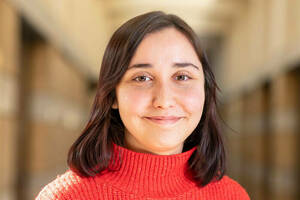
Sehrazat G. Mart is a Ph.D. student in peace studies and sociology and interested in empowerment of marginalized groups , social movements, and structural transformations. Originally from Turkey, she studied sociology in her home country, and later, received her Master’s degree at the University of Notre Dame. For Sehrazat, completing a Ph.D at the Kroc Institute is an opportunity to combine two of her passions and generate knowledge that can reduce violence and inequality.
In this interview, Sehrazat shares her thoughts on the power of teaching and the benefits of studying two interconnected fields at the same time.
Why were you drawn to the Kroc Institute?
I was applying for sociology graduate programs when I saw that Notre Dame had one in both peace studies and sociology. Two things immediately caught my attention about the program: its multidisciplinarity and commitment to social justice. At the time, I was part of a multidisciplinary project to design floating earthquake shelters. As a sociologist, working with civil engineers and architects taught me to think outside of disciplinary silos. The idea of collaborating with peers from other disciplines excited me.
Regarding the justice component, I often think that sociology’s desire to be perceived as “science” limits the disciplinary possibilities of critique and action. So I thought peace studies and sociology were the perfect fit for each other and for me! In this program, I can do scientific research with a commitment to end structural violence and contribute to building just societies.
How do peace studies and sociology enhance one another?
Together with other Kroc-affiliated colleagues, I recently wrote a blog post on this topic for the American Sociology Association’s Peace, War, and Social Conflict section. Sociological research is a powerful tool to expose social and institutional patterns of exclusion, inequality, and violence. Peace studies is a field where scholars and practitioners work together with normative and practical orientations toward peace and justice. When combined, sociology and peace studies can create applicable knowledge tailored to address real-life violence and deliver knowledge to multiple audiences, including not only scholars but peacebuilders, politicians, and the broader public.
What are your current research projects?
The overarching motivation that drives my research is identifying factors that empower people - ranging from informal settlement communities to youth - to challenge authoritarian governments.
I spent my first couple of years in graduate school researching the implementation of urban transformation projects in Turkey. These projects replace informal settlements with upper-scale commercial and residential buildings. I investigated when and how public officials listened to the demands of the residents at informal settlements instead of overlooking their needs, excluding them from implementation, and displacing them. Currently, I am studying the student movement against the authoritarian government in Turkey in order to understand how inter-generational differences shape protests.
You recently received a teaching award for your work with Professor George Lopez in teaching “Intro to Peace Studies.” What did you like about working with students and the Intro to Peace Studies curriculum?
I love teaching because it is a transformative experience for everyone involved. In “Intro to Peace Studies,” students learn about systemic racism, climate change, violence against women, and many other forms of violence. While teaching about these wicked problems, Professor Lopez and I aimed to instill hope in students that they can contribute to “justpeace.”
I was inspired by sociologist and peace studies scholar Elise Boulding’s work that shows that imagination is a powerful tool for peacebuilding. Modeling the radical imagination Boulding promoted through her work, I asked the students to think of a future in which they have unlimited power and resources. Their creativity in this group exercise generated exciting and hopeful conversations about action plans to change the world. We then compared their plans to real-world examples to recognize that many actors are already carrying out similar change projects despite resource constraints and power imbalances. It was an empowering experience for all of us to see that we can build the peaceful and just futures we want, starting today.
Where do you see yourself on the Strategic Peacebuilding Wheel?
This is a difficult question for me. In my academic life, I work to produce knowledge that would facilitate structural and institutional change. I use education to change the world through research and teaching, but I don’t think that is enough. As scholars, we should do more public-facing scholarship and address a variety of audiences, including the communities we study and policymakers. One of my recent attempts in public scholarship and social engagement is podcasting. Scholars already know so much about inequality and injustice; we should be doing more to make our knowledge relevant and applicable so that the structural violence we expose doesn’t continue harming people.